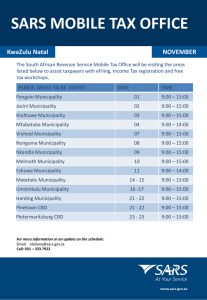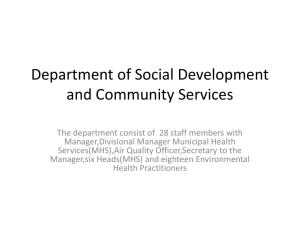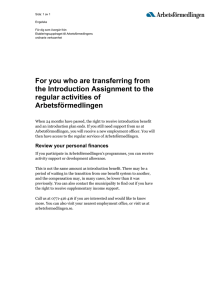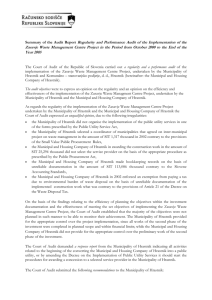REPORT
advertisement
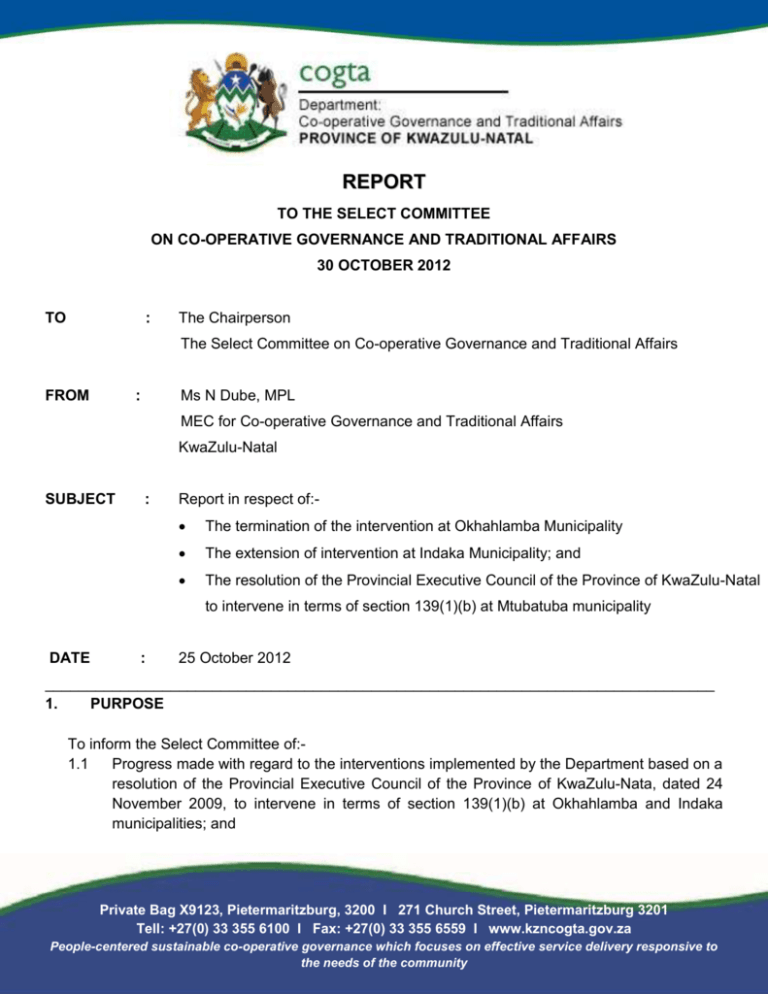
REPORT TO THE SELECT COMMITTEE ON CO-OPERATIVE GOVERNANCE AND TRADITIONAL AFFAIRS 30 OCTOBER 2012 TO : The Chairperson The Select Committee on Co-operative Governance and Traditional Affairs FROM : Ms N Dube, MPL MEC for Co-operative Governance and Traditional Affairs KwaZulu-Natal SUBJECT : Report in respect of: The termination of the intervention at Okhahlamba Municipality The extension of intervention at Indaka Municipality; and The resolution of the Provincial Executive Council of the Province of KwaZulu-Natal to intervene in terms of section 139(1)(b) at Mtubatuba municipality DATE : 25 October 2012 ________________________________________________________________________________ 1. PURPOSE To inform the Select Committee of:1.1 Progress made with regard to the interventions implemented by the Department based on a resolution of the Provincial Executive Council of the Province of KwaZulu-Nata, dated 24 November 2009, to intervene in terms of section 139(1)(b) at Okhahlamba and Indaka municipalities; and Private Bag X9123, Pietermaritzburg, 3200 I 271 Church Street, Pietermaritzburg 3201 Tell: +27(0) 33 355 6100 I Fax: +27(0) 33 355 6559 I www.kzncogta.gov.za People-centered sustainable co-operative governance which focuses on effective service delivery responsive to the needs of the community 1.2 2. The state of affairs at Mtubatuba Municipality which lead to a resolution of the Executive Council to intervene in terms of section 139(1)(b) of the Constitution at Mtubatuba Municipality. BACKGROUND On 24 November 2009 the Provincial Executive Council of KwaZulu-Natal resolved to intervene at Indaka and Okhahlamba municipalities in terms of section 139(1)(b) of the Constitution as a result of failures to fulfill various executive obligations. The MEC was authorised to appoint representatives to undertake the functions in terms of section 51 of the Municipal Systems Act to establish and organise the administration in a manner that would enable the municipality to achieve the objects of local government as set out in section 152 of the Constitution. On 18 July 2012, the Executive Council resolved to terminate the intervention at Okhahlamba municipality and to extend the intervention at Indaka municipality. On 19 September 2012 the Executive Council resolved to intervene in terms of section 139(1)(b) of the Constitution at Mtubatuba municipality for its failure to fulfill various executive obligations. The MEC was authorised to appoint a representative to undertake the function in terms of section 51 of the Municipal Systems Act to establish and organise the administration in a manner that would enable the municipality to achieve the objects of local government as set out in section 152 of the Constitution. 3. DISCUSSION With regard to the progress made in respect of the interventions and which lead to the termination of the intervention at Okhahlamba municipality and the extension of the intervention at Indaka, the Department reports as follows:3.1 OKHAHLAMBA MUNICIPALITY The rate of progress made at Okhahlamba municipality in respect of key intervention priorities as identified by the administrator was significant and was not the reason for the extension of the intervention on 13 December 2011. The main issue was the fact that the municipality lacked a senior management team to sustain the progress and to implement any outstanding intervention priorities. Notwithstanding this the administrator reports progress on the following areas:Enhancement of Revenue Collection In so far as the Implementation of MPRA, a service provider was appointed for the verification and assessment of the existing Valuation Roll and the compilation of the supplementary Valuation Roll 2 for 2011/2012. This was done and completed in April 2011, with very few objections received, which were all subsequently resolved. To ensure continuous maintenance 2|Page of the Valuation Roll, the service provider was retained by the Municipality. Since the Valuation Roll is valid for five years, this Valuation Roll which has undergone major review will soon expire. The matter has been brought to the attention of the Municipality, and an advert for the service provider to assist with the new process is already out, for the 2013/2014 financial year assessments The Municipality had a debt book of over R18 million in the financial year 2010/2011, mainly because of poor management of debt, lack of debt management policy, failure of Finance Department to enforce collection, community attitude towards municipality due to bad publicity, and non-existence of Indigent Register. On analyzing the debt it was discovered that approximately R9,5 million was owed by occupants of unimproved low-cost housing scheme at Khethani, who should have been benefiting from Free Basic Services, i.e. enjoy 100% rates rebates, obtain free 6 kiloliters of water and free basic removal subsidy. That immediately brought the real debt down by over 50%. An Indigent Register has been compiled. The Municipality commenced discussions with individual entities and individuals that owe bigger amounts. The Municipality’s collection rate had since increased from the 36% collection rate recorded during the financial 2010/ 2011 to 61,44% accumulatively, as at 30 April 2012 against the annual target which is 75% Strict Expenditure Management measures (which amongst other things included cutting down on expenditure on non-service delivery costs like heavily staffed office of the Mayor, unnecessary trips, unfunded mandates) introduced by the intervention resulted in the Municipality having a total R81 million in cash reserves including all cash-backed conditional grants totaling just over R40million. With the reserves, financing of new equipment for maintenance of infrastructure and offices is being implemented. The Municipality is now able to accurately report on a monthly basis on revenue, expenditure, cash flow, debt recovery and creditors, using an Accounting package which it was considering changing. Governance The Municipality established all Council statutory, administrative and functional structures and they are all operational. Herein included is a fully functional audit committee and internal audit unit as well as IDP, Budgeting and PMS procedures. Operation Clean Audit Whilst the Municipality took a resolution binding itself to the achievement of Clean Audit by 2013/2014, it is highly likely that all queries raised by the Auditor General during the last 3|Page financial year may be resolved by this financial year, obtaining a clean audit in 2011/2012 which will be a phenomenal achievement. Service Delivery The Municipality has compiled the Infrastructure Maintenance Plan which is being implemented from June 2012, where all plant and equipment is sent to each ward for a period of 10 days to ensure that all existing infrastructure is maintained. This has been supplemented with/by the initiative of the Provincial Department of Social Welfare, where it embarked on repairing all Municipal Halls it uses as Old Pension and Grants payout points. The Municipality ensures that each Hall is allocated a caretaker, and a cleaner (on job-creation basis) once repairs are complete. Whilst the Municipality experienced difficulty in spending grants relating to MIG-funded and Small-Town Development-funded projects during the period of between October 2011 and March 2012, with assistance from Cogta where a dedicated project manager was sourced, all these projects are now moving, and are fairly within the acceptable expenditure levels. Electrification project funding which was nearly lost due to non-expenditure and reporting has now been re-secured with the Implementing Agent already appointed. The areas of Thintwa will now be electrified as originally planned. Institutional Development As the staff establishment has been regularly reviewed to meet the realistic needs of the Municipality, and budgeted posts had been timeously filled, besides the Strategic Management positions where political differences between the members of the coalition parties led council to a stalemate, which gave rise to the MEC for COGTA intervening. This intervention by the MEC lead to the ratification of the appointment of the Municipal Manager and the CFO who commenced their duties in February and April 2012 respectively, and the positions of the Director: Corporate Services, Social Services and Economic Development, and Technical Services being re-advertised. Those of the Director: Social Services and Economic Development, and Technical Services have been re-advertised and shortlisting concluded on the 5th of June 2012. Interviews took place on the 11th of June 2012. The Council confirmed the two appointments on 25 June 2012. The Labour Forum is fully functional and is consulted wherever matters of their interests are under review. All disciplinary matters which had to be finalized internally are concluded besides two matters (that of the former Municipal Manager and the former Supply Chain Officer both dismissed) whose matters are at the Bargaining Council for arbitration, and that of the four employees who vandalized Council property. 4|Page The matters under investigation, civil recoveries and criminal cases etc, progressed fairly well, in fact it is up to the law enforcement agencies to see them total finality. On discovering that Section 106 Investigation findings were inconclusive due to lack of information, and relevant documentation, and the difficulty experienced by PWC in preparing Annual Financial Statements of 2009/2010, an investigation on missing vouchers was authorized. Okhahlamba provided PWC with electronic records of unsupported payments totalling R93 788 797.25 for the 2008/9 financial year and R19 832 142.04 for the 2009/10 financial year. After subtracting payments made to recognisable institutions and individuals (e.g., Telkom, Eskom, etc.) the balances of unsupported payments were R86 237 805.84 in 2008/9 and R10 966 061.11 in 2009/10 (total R97 203 866.95). The initial approach was to request for invoices in respect of the payments from the suppliers. This approach was subsequently abandoned when it was discovered that payments made to 8 out of the first 10 suppliers selected were irregular, with the suppliers having fictitious addresses or not being able to account for the payments they received from Okhahlamba. The report relating to this phase of the investigation was issued on 2 August 2010. Okhahlamba thereafter requested PWC to conduct a detailed investigation of the unsupported payments. PWC requested the then Municipal Manager, Mrs Zakhona Ndlela on 25 August 2010 to authorise the detailed investigation phase and utilise the balance of R240 000 of the amount quoted for phases 1 and 2 of the investigation. Mrs Ndlela failed to authorise the detailed investigation until her departure from Okhahlamba. Ms Fikile Ngcobo, who replaced Mrs Ndlela in an acting capacity, subsequently authorised further investigation which resulted in PWC providing in its report, a table reflecting its findings relating to the suppliers. Due to budgetary and other constraints, a total of R83 262 752.57 (85.7% of R97 203 866.95) of the payments were covered in the review. PWC investigated and issued four reports relating to various suppliers, payments to whom had been classified as suspicious. In all of these reports, PWC found serious cases of irregular payments and recommended that criminal cases be opened. Cases Number 94/5/2010, 96/5/2010, 100/11/2011, and 95/5/2010 have been opened. Local Economic Development The Municipality’s LED Strategy, with assistance from Provincial DEDT has been reviewed, whilst the Spatial Development Framework review is current underway. The Municipality has a new entity, known as, Okhahlamba Development Agency. It’s Board Members have been appointed. There are two projects that the Agency is undertaking, viz the development of the Business Centre, which is current and funded by the DEDT, and the Cable Car aimed at linking KZN to Lesotho, and is still at the planning stage. The project’s mention by the MEC for DEDT in his budget speech has indicated that this is now a reality. 5|Page Conclusion Based on the stabilization of the administrative leadership of the municipality, and significant progress in the implementation of intervention and recovery plan activities, the intervention at the Okhahlamba Municipality was terminated. The department continues to monitor the municipality closely and engages regularly with the leadership on various financial and non-financial matters. 3.2 INDAKA MUNICIPALITY Although the administrator had reported progress in respect of the recovery plan he alerted the Department to certain serious challenges which required supervision and monitoring within the scope of the intervention, the reported as follows:Finance The status on Financial Management was fair. The secondment of the COGTA’s Financial Expert has had a major positive effect on the implementation of the Recovery Plan on financial management. The expert together with the administrator was in the process of reconstructing the financial records of Indaka, going as far back as 2009/10 on certain transactions to date. Various financial irregularities had been reported and because it is obvious that certain activities were done, deliberately without the administrator’s knowledge, the intention was to issue civil summons to recover all the irregular and fruitless expenditure from the former Municipal Manager and affected Councillors. The team had also uncovered certain irregularities which slipped the radar of the AG, for instance Indaka had been running an illegal internal loan scheme from 2002 until mid 2010. No previous audits had ever picked up this illegal scheme. Further resources were required to complete and finalise the investigations in this regard. Various meetings were held with the office of the AG to discuss with them the progress made on their recommendations of the previous audits and to seek direction on certain aspects on the way forward for 2012 Annual Financial Statements. Governance The majority of priorities in respect of governance as identified in the recovery plan have been met. The Internal Auditor was effective, but was stifled by the management’s failure to either respond to the audit findings or failure to implement the recommendations. It appears that there is poor leadership in this municipality, although, all the necessary Policy Frameworks are in place. The problem, however, is a lack of implementation. The Audit Committee is being reviewed with a view to strengthen it. 6|Page Leadership and PMS These categories have been combined as they are closely related. Moreover, the weakness in leadership and Performance reporting affects directly the “Oversight role” of the Council over both the Executive and the Management. Although in the areas of Finance and Governance, the administrator was able to force through and implement some of the actions and controls that have resulted in some improvement; in the areas of leadership and Performance reporting, it was not being implemented. A Reporting Framework was developed by the administrator, including detailed footnotes on how to populate the reporting template. Consistent reminders are sent to the Management on what they should report on in each quarter for the Quarterly Reports with no response. Reminders are sent to the Mayor telling him to demand the Quarterly/Monthly Report also with no success. According to the administrator’s assessment, the Council’s Oversight and Performance Management and Reporting, is a concern and much work is yet to be done. The Council received the Mid-Year report in February 2012 and March Quarterly report in May 2012 for the first time in history of Indaka Municipality. These two reports are inciting the concern of councillors and they have begun to ask questions, but, he is of the view that they are still not ready to stand without the Provincial Intervention. Institutional Seven (7) employees were charged for various counts of misconduct, including the CFO and the Manager for Technical Services. Five (5) of the cases were finalised early this year. There were two dismissals, two final warnings and one acquittal. The cases of the CFO and Manager: Technical Services were postponed to June 2012. However, the employment contracts of the Manager: Technical Services and the CFO terminated by expiry in April 2012 and May 2012 respectively. The positions have since been advertised and recruitment is underway. Despite some improvements, it was clear that there were still serious challenges which had been confirmed by the administrator. He further illustrates as follows:(i) In the year ended in June 2011, the Municipality incurred unauthorised expenditure of R4.644 millions and irregular expenditure of R22.500 millions; totalling R27.2 million. (ii) In January 2012, the Mid-Year Review established a number of irregular, unauthorised and fruitless and wasteful expenditure which were reported to the Council as part of the Mid-Year Review report. The copy of the report was forwarded to the Department as part of monthly reporting. The administrator advised the then Acting Municipal Manager (Mr. Maphanga) to report the said expenditures in terms of section 62 of MFMA for general failure of the system and section 32(4) of the MFMA, to the MEC responsible for Local Government in the Province and the Office of the Auditor-General. The administrator reports that such irregular expenditures have not been reported to the MEC and the AG. 7|Page Conclusion There has been various irregular financial activities resulting in an increase in unauthorized, irregular, fruitless and wasteful expenditure, which continued under the stewardship of the Administrator without his knowledge reflected defiance by the administrative and political leadership of the municipality and undermined good governance. In addition, the administrative leadership of the municipality is still unstable with key senior positions of CFO, Director: Technical Services remaining vacant. The Mayor and council are still unable to exercise effective political oversight and strong leadership to promote financial prudence and good governance. Consequently, the intervention was extended at the Indaka Municipality. 3.3 MTUBATUBA MUNICIPALITY In June 2012 Cabinet resolved to institute a discretionary intervention at Mtubatuba Municipality in terms of Section 136-138 of the Municipal Finance Management Act 56 of 2003, for a period of three months as a result of unfavourable financial conditions which were identified by the MEC responsible for COGTA and the MEC responsible for Finance. The Financial Administrator appointed by the Department of Cooperative Governance and Traditional Affairs had achieved substantial progress in drafting and implementing a financial recovery plan which sought to address the causes of the financial crisis. A detailed assessment report in respect of the Mtubatuba Municipality highlighted the weakness leading to the intervention is attached at Annexure A. The discretionary intervention had been in place over the past three months, prior to September 2012, and there appeared to be an extremely low probability of the intervention support team succeeding in substantial progress being achieved in the area of financial recovery and implementation of internal financial controls, the council was failing to fulfil its executive obligations necessary for the effective functioning of the municipality. The municipal council had failed to exercise effective, transparent, accountable and coherent corporate governance and conduct effective oversight of the affairs of the entity. The Financial Administrator observed that certain councilors had conducted themselves in a manner contrary to the Code of Conduct for Councillors in terms of the Systems Act. This was evident in the manner in which certain councillors disrupted council meetings by staging “walkouts”. During a council sitting on 30 July 2012, the IFP walked out of council proceedings without the permission of the speaker. The dress code of councillors also does not indicate that there is respect for the municipal council. It appears that two Councilors were involved in a public brawl with each other on municipal property. The incident occurred on 13 August 2012 8|Page which was witnessed by certain members of the community. Criminal charges of assault have been instituted. This is indicative of the lack of adherence to the Code of Conduct. The Department is informed that the deputy mayor (NFP) is subject to disciplinary hearings within his party which may result in a replacement of the deputy mayor. Despite the municipality being in a precarious situation in respect of finances and operating on a deficit budget, it appears that certain councillors were attending seminars in other provinces, incurring unnecessary expenditure which impacts on the financial crisis. This is indicative of the lack of commitment of councillors to the financial recovery at the municipality, which is surely to fail if the political leadership is not committed and display deliberate disregard for financial controls and constraints. Council was in disagreement over the filling of critical posts. The IFP had allegedly requested a trade off in respect of the appointment of a Community Services Manager of their choice, as they had allegedly permitted the NFP to appoint the municipal manager of the NFP’s choice. Council is unable to finalise the recruitment of section 57 managers, as recommended by the intervention team. This sort of “arrangement” is in direct contravention of the amendments to the Systems Act which seeks to depoliticise and professionalise the appointment of senior managers in municipalities. It is also observed that the local labour forum is dysfunctional. The municipal manager has appointed officials into critical posts without following the municipality’s approved recruitment procedures and policy. The appointment process followed for the filling of vacancies within the municipality is not transparent and may result in litigation by unsuccessful candidates and possible damages which the municipality cannot currently afford. The municipality had failed to appoint a service provider timeously to undertake the compilation of the second general valuation roll, which may lead to the municipality incurring a loss of property rates income. The council had failed and/or neglected to conduct performance assessments on senior managers. The failure of council to conduct such assessment has serious consequences in respect of municipal performance as a whole and constitutes a contravention of the Systems Act as well as the Local Government: Municipal Performance Regulations, 2006. Although service delivery has gradually stabilized, there are serious matters pertaining to waste management as a result of the operation of an illegal refuse removal site i.e. :a. Illegal waste disposal site, b. Failure to maintain plant to ensure that service delivery is not affected c. In ability to maintain current infrastructure using own staff and equipment Council’s failure to legalise its waste disposal site will result in service delivery challenges and possible litigation against council. Furthermore, the municipality’s failure to maintain 9|Page infrastructure, such as roads, buildings, street lighting and storm water drainage may result or prompt community protests. The poor asset management by the municipality may lead to the prognosis of the municipality receiving a qualified audit opinion. The council had entered into unsustainable contracts with certain service providers and is heavily indebted due to contracts that were signed and which currently bind the municipality. The municipality has neglected to pay creditors within 30 days as stipulated in the MFMA, which exposes the municipality to the risk of legal action by disgruntled creditors. The Department has recently received correspondence from the legal representatives of a judgment creditor advising, that after obtaining default judgment against the municipality, the creditor has instructed to proceed with the attachment of municipal assets for the liquidation of the judgment debt. The same creditor is due, shortly, to issue summons for further outstanding debt. The municipality is also currently facing litigation as a result of the cancellation of a contract with a security company for R1 400 000. In terms of section 136(4) of the Municipal Finance Management Act, 56 of 2003, if a municipality as a result of financial crisis, is unable to meet its financial commitments, as a result of which the conditions for an intervention in terms of section 139(5) are met, then the Executive Council must intervene in the municipality in terms of section 139 of the Constitution. Based on the current cash flow, it appears that the municipality will be without sufficient cash resources to pay debts, as they become due from March 2013, unless negotiations to reduce monthly payments succeed. The supply chain management unit remains significantly understaffed and will compromise the integrity of the unit, due to a lack of segregation of duties. The cost of salaries continues to be significantly high and there are unnecessary costs being incurred currently for personal protection services. The municipal manager has two body guards, the deputy mayor has two bodyguards, and the mayor has one bodyguard. The council had failed and/or neglected to implement the findings and recommendations of a forensic report concluded in terms of section 106 of the Systems Act, which exposes the municipality to further risk. Currently various senior officials are engaging in irregular activities which would, in all probability, prompt an extension of the forensic investigation. Council had appointed a committee to finalise and review the process of the sale of immovable property described as Erf 322 in St Lucia for R4.5 million. Based on the report of the committee, it was resolved that the sale of the said land should proceed. However, discussions between the Section 137 Intervention team and the Special Investigating Unit in Durban revealed that the transaction may be regarded as invalid and a legal opinion is awaited in this matter. There appears to be continued disagreements in council which impacts on the functioning of portfolio committees of council which do not sit as planned and the municipal public accounts committee is still not functional within the municipality. 10 | P a g e Executive obligations not met The Mayor and Executive Committee have, amongst others, failed to fulfil the following specific executive obligations relating to the executive committee of the council: (i) section 99 of the Systems Act, by failing to exercise supervisory authority in relation to the implementation and enforcement of the municipality’s credit control and debt collection policy and by-laws; (ii) section 52 of the MFMA, by failing to take all reasonable steps to ensure that the municipality performs its constitutional and statutory functions within the limits of the municipality’s approved budget. In addition, the municipal council has, amongst others, failed to fulfil the following executive obligations relating to the administration of the municipality: (i) section 41 of the Systems Act by failing to include measurable priorities, objectives and performance targets for certain functions as reported by the Auditor-General; (ii) section 46 of the Systems Act by not providing adequate performance information in the annual report of the municipality for the 2010/2011 financial year, as reported by the Auditor-General; (iii) section 32 of the MFMA by failing to recover unauthorised, irregular, fruitless and wasteful expenditure, and failing to inform the MEC responsible for local government and the Auditor-General of such expenditure; (iv) section 54 of the MFMA by failing to exercise budgetary control and early identification of financial problems over two consecutive years; (v) section 72 of the MFMA by failing to conduct a mid-year budget and performance assessment of the municipality within the statutory deadlines for two consecutive financial years; (vi) section 121 of the MFMA by the exclusion of performance information in the annual report of the municipality; and (vii) section 131 of the MFMA by failing to address issues as contained in the AuditorGeneral's report for consecutive years. It was apparent that the municipality was in serious and persistent breach of various provisions of the MFMA and the Systems Act, and had shown a continued decline in financial management, performance management, service delivery and governance attributed to a lack of accountability and transparency. The council had condoned irregular, fruitless and wasteful expenditure as is evident from the Auditor-General’s report on the 2010/2011 financial year. The 11 | P a g e municipality is unlikely to achieve an unqualified audit opinion for the financial year ending June 2012, for reasons such as the assets register not being fully compliant in terms of GRAP standards. The mayor and the executive committee had failed to exercise oversight over the administration and the finances of the municipality and to report effectively to council. For these reasons the Executive Council resolved to intervene in terms of section 139(1)(b) of the Constitution. The MEC met with the council of the municipality on 28 September 2012, informing the municipality of the reasons for the intervention and the appointment of her representative and his role in respect of the intervention. The representative, Mr. K. Mpungose was introduced on 03 October 2012. SUBMITTED MS. N. DUBE MEC FOR CO-OPERATIVE GOVERNANCE AND TRADITIONAL AFFAIRS 30 October 2012 12 | P a g e



